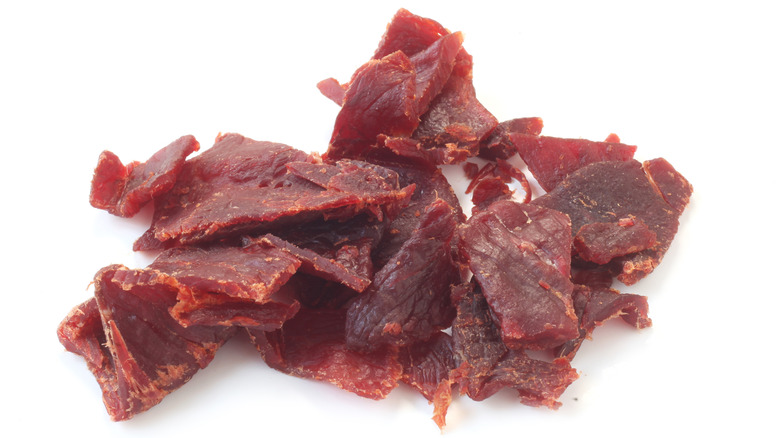Why Beef Jerky Isn't As Healthy As You Might Think
Beef jerky is a tasty snack and a great source of protein, but is it actually good for your health? With the name originating from South America, beef jerky is a popular snack food made from thin strips of lean meat that are dried and marinated in different types of sauces, seasonings, and spices (via Healthline). High in protein and low in carbohydrates, beef jerky is generally considered to be a nutritious snack.
One serving of beef jerky contains more than 9 grams of protein, 3 grams of carbs, and 116 calories. It is also rich in a variety of vitamins and minerals, like zinc, vitamin B12, phosphorus, folate, and iron, all of which can help improve your immune function and boost your energy levels. Since beef jerky is packed full of protein, it can also help keep you feeling full longer. Not to mention, its portability and long shelf life make it an ideal food to eat on the go.
The downsides of beef jerky
Although beef jerky is a nutritious, high-protein snack, it's not quite as healthy as you might think. That's largely because beef jerky is processed and cured. Curing is the process of preserving meat by drying it and packing it with salt. As a result, most beef jerky is fairly high in sodium (via LiveStrong). Just a single 1-ounce serving of beef jerky contains around 509 milligrams of sodium, which is a hefty chunk of your daily recommended sodium intake.
According to the U.S. Department of Agriculture, you should try not to consume more than 2,300 milligrams of sodium per day (via Healthline). Excessive sodium intake may elevate your blood pressure and put added stress on your heart. Beef jerky is also highly processed, and consuming large quantities of processed red meat can increase your risk of developing cancer. However, this doesn't mean that you can't enjoy beef jerky from time to time, it just means that it should be consumed in moderation.


